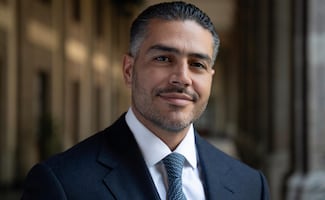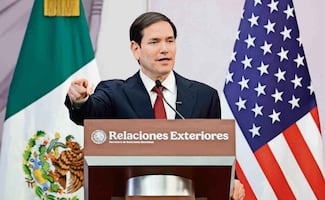Más Información

New York Times destaca rol de Harfuch en el combate del narco; resalta intercambio de inteligencia con EU

Marco Rubio destaca labor de seguridad de México; "están haciendo más que nunca en su historia", afirma

"Queremos cerrar este capítulo", dice Salinas Pliego al SAT; esperarán a enero a conocer fundamentos legales de adeudo fiscal
The construction of a new airport, be it in Texcoco , where it is currently being developed, or in Santa Lucía , as President-elect Andrés Manuel López Obrador has proposed, are now the two options on the table for the Mexican people to choose through public consultation . However, the first option has been sharply criticized due to alleged corruption cases involved in its construction, as well as the environmental damage it could cause, while the second option has been ruled out by several institutions that have deemed it unprepared and “unfeasible.”
On August 17 , López Obrador presented both proposals to carry out a project that has been on the national agenda for 20 years , and that, due to its political cost, former presidents of Mexico had not wanted to assume. Now, the president-elect has announced that the project will be subject to public consultation, making all necessary documents available for citizens to make a decision, making up more than 280 folders, half of which are in English .
During López Obrador’s electoral campaign, the candidate claimed that “the construction of the new Mexico City airport (NAICM) in the lake of Texcoco is literally a bottomless barrel, another heist conducted by the mafia in power against the people and the nation ,” and so he decided to place the future of this project in the hands of Mexico’s citizenship, though later he admitted that the construction of the new airport was necessary. His “ alternative plan for the New International Airport of Mexico City ” is to maintain the operation of the current airport and build two airport runways in the base of Santa Lucía , a project which MITRE (the air navigation corporation) deemed as “ unfeasible .”
Regarding corruption and environmental damage of the NAICM project, in an interview with EconomíaHoy.mx , Julia Lamberti, coordinator of investigation at PODER Project , stated: “The government elect knows that the construction of the new airport that was first proposed during Peña Nieto ’s administration has presented many issues in terms of corruption and lack of transparency ; it is the private companies involved in the construction that are benefiting from the project. The new administration finds it difficult to accept the NAICM construction under these conditions.”
In 2015 alone, the Federal Superior Auditors (ASF) reported irregularities totalling 835.5 million pesos in the project . “If we add to this the social and environmental impact, plus the lack of transparency, and the signs of corruption that are coming to light through the ASF, we cabn assume that the project will have an overall negative impact. We are sure that this airport is not in the best interest of the Mexican citizenship,” warned Lamberti.
Another option proposed by the upcoming government is to concession the airport so that it does not involve any further public spending, though Lamberti warned that this would be the worst-case scenario.
“The worst option would be to concession the airport to private companies, given that the money’s traceability will be virtually nil, considering that neither the civil society nor the government may intervene in auditing contracts between private institutions. This would be the least feasible option to reduce corruption levels,” he warned.
Juan E. Pardinas, from the Mexican Institute for Competitiveness (IMCO)
stated that the full concession of the new airport was a feasible option, and a possible alternative to its cancellation; however, this would imply a very thorough study on the losses that the Mexican State would suffer for the use of such a valuable operation.
“If we concession the airport, there will be savings on the short term and losses on the long term. It could be a good decision or not, but we do need to be clear about the potential costs of its cancellation,” he claimed.
According to Javier Jiménez Espriú, soon-to-be Communications and Transports secretary, the citizen consultation will begin on October 28.
dm
Noticias según tus intereses
[Publicidad]
[Publicidad]












